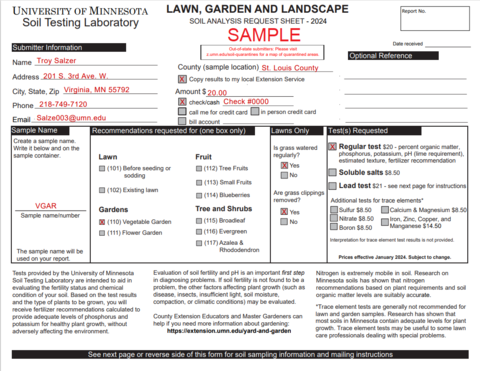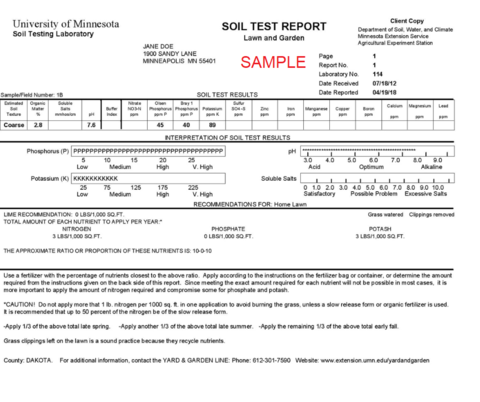Let's take a deeper look into and provide more information about soil sampling. We will cover why you should consider, how to collect, how to submit, and how to interpret a soil sample submission.
Why should I test my soil?
Soil testing helps to identify nutrient-related issues, allowing for strategic and efficient application of nutrients for crop growth and reducing the potential for over or under-application, thus minimizing cost and environmental risk.
How often should I submit a soil sample?
It is recommended to perform a soil test on a field every four years or to diagnose nutrient-related plant growth issues.
What does a soil sample test?
The regular series tests phosphorus, potassium, pH, % organic matter, and estimated texture. Additional tests can be requested for nitrogen or other micronutrients.
Collecting a soil sample
Using a shovel or soil probe, dig a hole or probe at least 6 inches of soil depth. Place the subsample into a bucket or container. Collect 12-15 subsamples for a field and 4-6 for a garden. For an accurate soil sample, aim to take the same amount of soil from each sampling location. Thoroughly mix the subsamples together. Place 2 cups of composite sample into a well-labeled bag. Ship or deliver to the soil testing lab with the sample submission form.
Submitting a soil sample
The required submission form has been shared below but can be found in a printable format on the website. More information about properly submitting soil samples and the submission forms can be found on the Soil Testing Laboratory website.
Soil samples can be placed in Soil Testing Laboratory sample bags (available at University of Minnesota Extension offices) or placed into well-labeled plastic bags/containers. Note that containers will not be returned.
A flat-rate box or poly mailer should be used to keep all components in a sample submission together for mailing. Composite samples, Soil Submission Forms, and payment can be shipped or delivered to Soil Testing Lab.
Mail or deliver completed samples to the Soil Testing Laboratory: UMN Soil Testing Laboratory 135 Crops Research Building 1902 Dudley Avenue St. Paul, MN 55108
Understanding a lawn and garden soil sample result
A yard and garden result can be viewed in a similar manner to a farm and field, but recommendations are given in terms of lbs./1000 sq foot instead of lbs./acre.
If you have any questions related to the interpretation of a yard and garden soil sample, reach out to your Extension educator via the Horticulture Phone Line at (218) 733-2870 and press 2 to leave a message.
One critical thing about the results is to understand the organic level, if below 5-6%, add organic matter. Peat, yard compost, manure compost, and cover crops (green manure) may be added to increase organic matter.
If the pH range is outside of 6-7, pH modification may be recommended. This can be done with the addition of lime if the soil has low pH, or sulfur if the soil has high pH.
For a short-term fix, the use of ammonium sulfate as a nitrogen source will also reduce the pH. Then, look at phosphorus and potassium to follow recommendations.
Nitrogen drives plant growth and is often the most limiting nutrient. Residual nitrogen is available and is calculated for the results based on organic matter concentrations.
Leafy green crops and sweet corn will often require nitrogen application. When applying nitrogen, till down and top dress beds. Utilize the percentages of nutrients on the label to determine the amount of nitrogen (N), phosphorus (P), and potassium (K) to apply.
Nutrients are listed on the label in the order N-P-K depending on the percentage in the mixture.
Calculating NPK
Calculating N-P-K applications can be completed using your lawn and garden soil sample result.
Remember that nutrient content in fertilizer is given in the form of percentages in the mixture, so calculations must be completed to apply the desired lbs./1000 sq ft.
Reach out to your local Extension office for assistance in determining the amount of fertilizer needed for your yard or garden.
Remember that nutrients are listed as N-P-K percentages on a fertilizer label. To achieve the desired fertilizer application, a calculation must be completed to determine the application rate.
As an example, this fertilizer test suggests 3 lbs./1000 sq ft of Nitrogen, 0 lbs. Phosphorus, and 3 lbs. of Potassium. If we were to purchase a 10-0-12 fertilizer, it would contain 10% Nitrogen, 0% Phosphorus, and 12% Potassium. 10% Nitrogen is equivalent to a concentration of 0.1. To calculate the Nitrogen application needed we would take 3 lbs. N divided by 0.1 (concentration) to give 30 lbs. of product required to be applied per 1000 sq ft. This can then be scaled by the square footage of your garden. With this in mind, we would be slightly overapplying the potassium, but not to a level of concern (30 lbs./1000 sq ft times 0.12 = 3.6 lbs./1000 sq ft, as opposed to the recommended 3 lbs./1000 sq ft).
It is important to remember that the soil test results are measuring the nutrient availability at the time the test was taken. Based on this fact, we recommend taking a soil test during the same season every time due to biological activity and to maintain the value of comparison.
In the case of the lawn and garden results, the lab provides a recommendation based on general garden nutrient needs. This is fine for the general gardener and will increase your success. Understand as your skill becomes more refined, you will learn certain crops/species need more of a specific nutrient to increase production, change flavor, and potentially reduce disease and insect risk.
If you are interested in using your results and would like to look up the specific requirements of any MN grown vegetable, please use the "Nutrient Management Guide for Fruit and Vegetable Crops in Minnesota" handbook.




